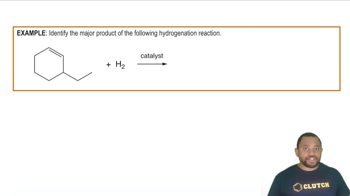Hydrogenation Reactions definitions Flashcards
 Back
BackHydrogenation Reactions definitions
1/10
Terms in this set (10)
- HydrogenationA chemical reaction involving the addition of hydrogen to unsaturated hydrocarbons, converting them into alkanes.
- AlkeneA hydrocarbon containing at least one carbon-carbon double bond, which can be hydrogenated to form an alkane.
- AlkyneA hydrocarbon with at least one carbon-carbon triple bond, requiring two moles of hydrogen for full hydrogenation.
- AlkaneA saturated hydrocarbon with only single bonds between carbon atoms, resulting from hydrogenation.
- Pi bondA type of covalent bond formed by the sideways overlap of atomic orbitals, present in alkenes and alkynes.
- CatalystA substance, often a metal, that increases the rate of hydrogenation by facilitating the breaking of hydrogen bonds.
- Metal catalystA specific type of catalyst used in hydrogenation to break the hydrogen-hydrogen bond efficiently.
- SaturationThe state of a hydrocarbon chain when all carbon-carbon bonds are single, achieved through hydrogenation.
- HydrocarbonAn organic compound consisting entirely of hydrogen and carbon, which can be unsaturated or saturated.
- ReagentA substance or compound added to a system to cause a chemical reaction, such as hydrogen in hydrogenation.


